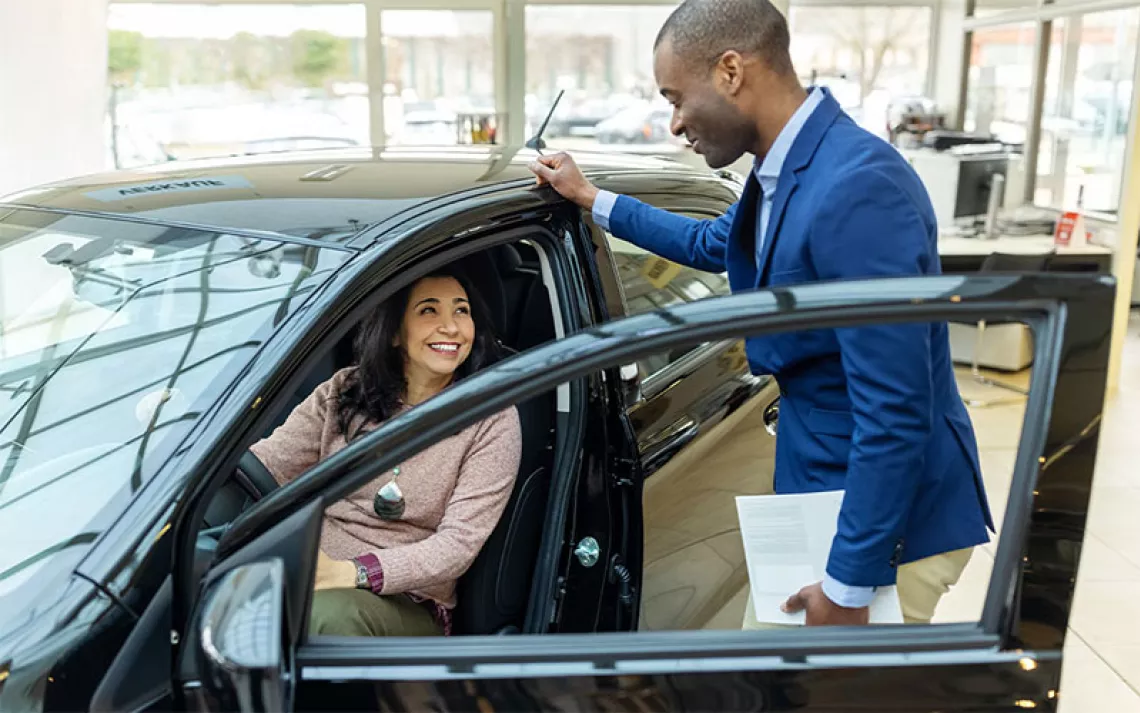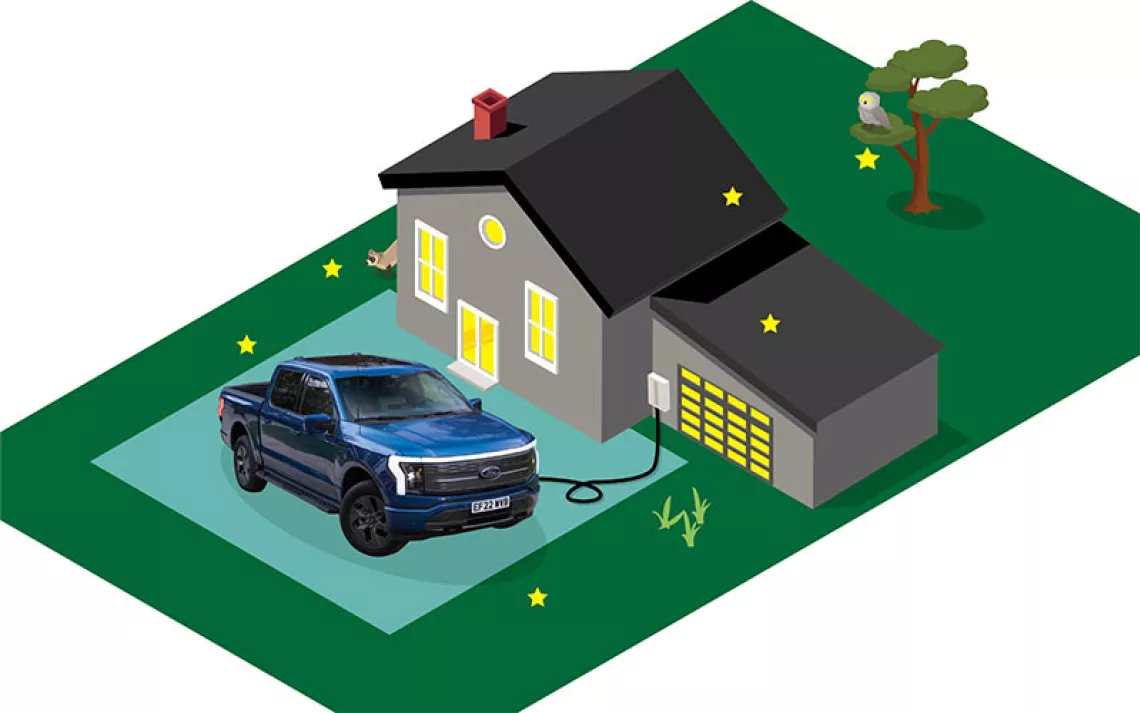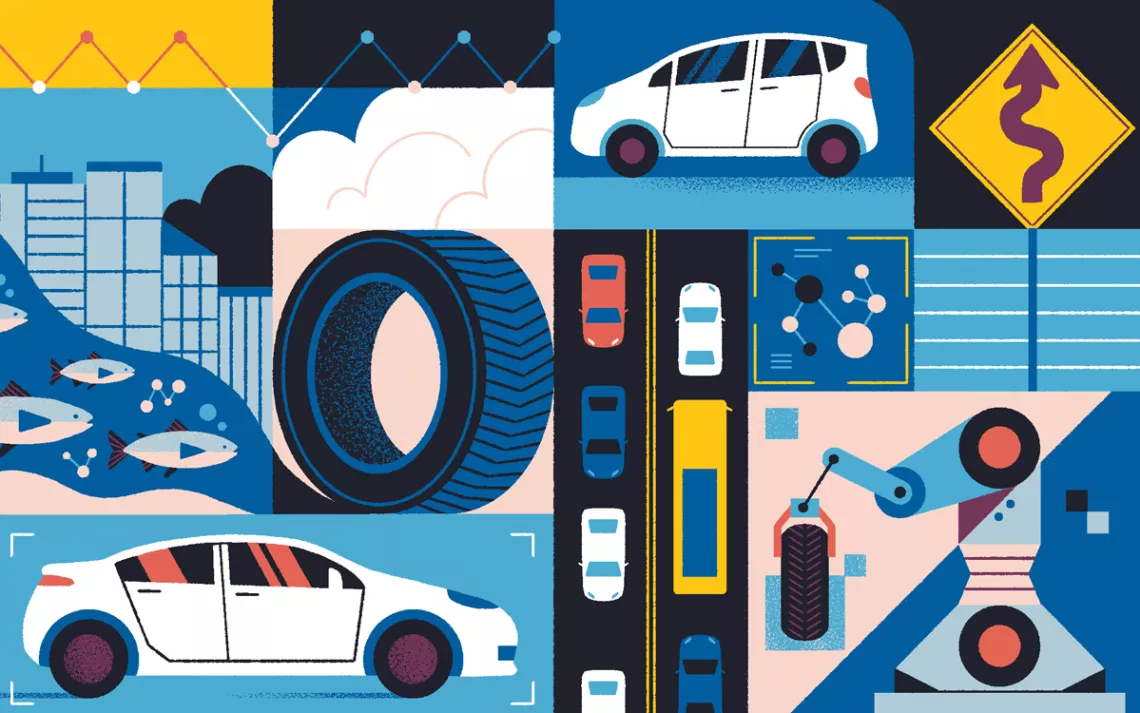Who Wants to Kill the Electric Car This Time?
The Koch brothers hope it will be them

Illustration By Steve Brodner
Illustration By Steve Brodner
Editor's note: David Koch died on August 23 at age 79.
IN FEBRUARY, Senator John Barrasso, a Wyoming Republican who chairs the Senate Committee on Environment and Public Works, introduced a bill to end the federal tax credit for plug-in electric vehicles and establish a new annual "highway user fee" for all "alternative fuel vehicles." If the bill becomes law, these provisions of the Fairness for Every Driver Act would check off two high-priority boxes on the policy wish list of Charles and David Koch, the billionaire petrochemical barons who have built a fortune on the transport and refining of fossil fuels. And this is no coincidence.
Barrasso is the third-highest recipient of campaign donations from Koch Industries, and in remarks on the Senate floor as well as in an op-ed published on the Fox News website, he cited figures from reports funded by the Koch brothers and their donor network. Speaking in the Senate, Barrasso said that the EV program "disproportionately subsidizes wealthy buyers" and that "hard-working Wyoming taxpayers shouldn't have to subsidize wealthy California luxury-car buyers." In effect, Barrasso justified the bill almost entirely with arguments—many misleading, some demonstrably false—tested and refined for years by Koch-affiliated think tanks, advocacy groups, and astroturfing operations.
Senator Barrasso's bill is just one example of how the Koch brothers and their Big Oil allies are working to decelerate the country's transition to electric cars. "The Koch network is opposing pro-EV policies at all levels of government, in public utility commissions, state legislatures, and the US Congress," says David Arkush, managing director of Public Citizen's climate program. "The campaign is classic Koch—a mix of front groups, campaign cash, corporate cronyism, and deception."
Several years ago, oil companies began to see EVs as a real threat to their businesses. Electric-car sales, virtually nonexistent when President Barack Obama took office, were rising consistently (though more than 1 million Americans have bought or leased an electric vehicle, EVs still represent only about 2 percent of new car sales). By the beginning of 2016, a new generation of plug-in cars targeting the mass market had been announced—including the Chevy Bolt, the updated Nissan Leaf, and Tesla's Model 3—all of which were promising 100-plus miles of range and a price tag around $30,000 after the federal tax credit.

Sign up to receive Sierra News & Views
Get articles like this one sent directly to your inbox weekly.
With this action you affirm you want to receive Sierra Club communications and may vote on policy designated by the Sierra Club Board.
About the same time, the Koch network began preparing a calculated campaign to keep gas-guzzlers on the road. In late 2015, a couple of key Koch agents started meeting with oil-refining and marketing companies to pitch a new "multimillion-dollar assault on electric vehicles," according to a HuffPost investigation. James Mahoney, a Koch Industries board member, and Charles Drevna, a former president of the American Fuel and Petrochemical Manufacturers, were raising funds to defend the oil and gas industry from stronger fuel-efficiency standards and transportation electrification.
In December 2015, an organization called Frontiers of Freedom, a front group that has received millions from ExxonMobil and Koch Family Foundations, created the Energy Equality Coalition with the express purpose of fighting the EV tax credit. The group's slogan for EVs is "Built by billionaires, bought by millionaires . . . and subsidized by the rest of us." Then, in 2016, Drevna launched an outfit named Fueling US Forward, which balanced oil and gas cheerleading with aggressive EV bashing. The group produced a YouTube video, "The Hidden Costs of Electric Cars," that described the EV tax credits as a "massive wealth transfer from poor to rich."
Fueling US Forward and the Energy Equality Coalition were part of a constellation of Koch-affiliated and Koch-funded organizations that created and amplified talking points and deceptive statistics, all with the aim of putting the brakes on the mass adoption of electric cars. When the Energy Equality Coalition launched, one of the group's board members, George Landrith, told The Weekly Standard, "Working-class people are paying taxes to subsidize luxury goods for the richest among us. . . . We believe there should be energy equality, not special treatment for the wealthy." Landrith's interview introduced rhetoric that would be employed by the Koch network for years. There was a two-page advertorial in The Hill, paid for by Koch Industries: "Such [hybrid and EV tax] credits may seem enticing to the general public, but the reality is that 90 percent of the beneficiaries come from the top income bracket." A brief written by Robert Bryce of the Manhattan Institute (which received more than $2.6 million from Koch foundations between 1999 and 2015) argued for a repeal of the tax credit: "Despite the endless hype about electric cars, vehicles that plug into the grid remain a niche product that is sold almost exclusively to the affluent."
These well-honed talking points were hammered into subsequent op-eds, commentaries, and interviews during the next few years, until they eventually made their way onto the Senate floor, where Senator Barrasso argued, "Nearly 80 percent of the tax credits go to households earning at least $100,000 a year." (Barrasso's point misrepresents the truth, because the figure doesn't include leased vehicles. More than half of all electric cars on the road are leased.)
Meanwhile, the Koch network is even better equipped to fight electric cars at the state level, exploiting two organizational structures that the Koch brothers have invested in heavily for decades: the American Legislative Exchange Council and Americans for Prosperity. For the inside game, the Kochs rely on ALEC, a "membership association of state legislators" that is, in fact, funded predominantly by private interests and is commonly described as a "corporate bill mill."
"State lawmakers and lobbyists gather at high-end hotels to vote equally on so-called model legislation, which legislators can take back to their state legislatures and introduce as state policy," says Jamie Corey of Documented, a watchdog group that examines corporate influence in public policy. "Koch Industries funds numerous organizations and trade associations within ALEC," Corey says, citing a 2017 membership document revealing that "Koch-funded organizations and its companies had the largest representation at their annual meeting."
In recent years, ALEC has put electric vehicles high on its agenda. In 2018, the American Energy Alliance introduced an ALEC resolution to enact punitive annual fees for driving plug-in vehicles—and many states took the bait. Today, there are at least 24 states with newly adopted EV fees, and 15 other state legislatures are considering them this year. By comparison, in 2015, only nine states had EV fees like those introduced by ALEC.
Such legislative efforts are then amplified by Americans for Prosperity, the "grassroots" advocacy organization heavily funded by the Koch brothers network. When state lawmakers are debating EV policies, or when there's a critical ballot initiative, AFP will often lurch into gear. In Colorado, the AFP chapter campaigned hard for a 2017 bill that would have repealed the state's EV tax incentive, and this year has launched an aggressive social media effort to rally against proposed clean-car standards. In Illinois last year, AFP lobbied against new state subsidies for EV charging infrastructure.
Environmental activists say that the Koch network's concern for a "level playing field" between conventional cars and EVs is little more than concern trolling. "These fees are unfairly punitive for EV drivers, while barely making a dent in state coffers," says Gina Coplon-Newfield, director of the Sierra Club's Clean Transportation for All campaign. She points out that EVs provide real benefits to states, since their lower weight reduces road wear and their lack of tailpipe emissions improves air quality and benefits public health. And, Coplon-Newfield says, for states genuinely concerned about losing gas-tax revenues to EVs, increasing state gas taxes by a mere penny would generate more money than raising registration fees for EVs. "AFP has put out resolutions to their conservative pro-oil-and-gas members, and those members and their allies have their marching orders. Now is the time to incentivize, not penalize, people for switching to cleaner transportation choices."
Though the AFP efforts to eliminate Colorado's EV tax credit ultimately failed, and the fate of the Illinois state subsidies is still unknown, the Koch network has other victories to boast. In Nashville, Tennessee, the AFP chapter rallied hard against a mass transit plan in 2018. The transit project had been viewed positively by two-thirds of voters until an AFP campaign kicked off, featuring local front groups, exhaustive door-to-door canvassing, and the use of the Kochs' private voter-profile-data network. Voters ultimately killed the transit plan.
The fate of Senator Barrasso's bill is undecided, though its companion act in the House is likely dead on arrival. In any case, the fight over the future of EVs is just beginning. An electrified transportation system would make the Kochs' core businesses obsolete—and, knowing as much, the Kochs are likely to keep their influence and policy machine churning. "The electric-vehicle market is growing extremely fast," Arkush says. "They're popular, peppy, and clean—and increasingly they're cheaper than conventional cars when you factor in lower costs of maintenance and savings on fuel."
What's not to like? "They aren't powered by oil," Arkush says, "and that's a nonstarter for the Kochs, who want to keep lining their pockets with profits from fossil fuels."
This article appeared in the July/August 2019 edition with the headline "Who Wants to Kill the Electric Car This Time?"
This article was funded by the Sierra Club's Clean Transportation for All campaign (sierraclub.org/transportation).
What You Can Do
Interested in checking out EVs for yourself? Register for a National Drive Electric Week event near you: driveelectricweek.org.
 The Magazine of The Sierra Club
The Magazine of The Sierra Club



